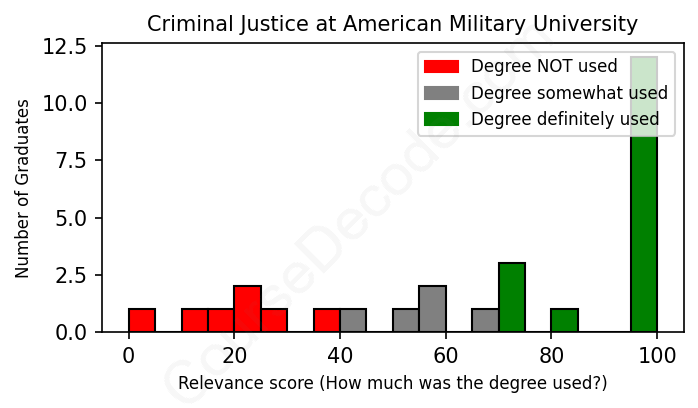
First, some facts. Of the Criminal Justice graduates from American Military University we've analyzed , here's how many have used (or NOT used) their degree in their career:

These are estimates based on AI analysis of 28 LinkedIn profiles (see below).
The verdict? On par with the average. Overall, with an average relevance score of 67%, Criminal Justice graduates from American Military University have about the same likelihood of finding work in this field as the average graduate across all fields:
And for comparison, here's the chart for all profiles we've looked at across all degrees.
Also, after graduating, 42% of these graduates have pursued further education other than another Bachelor's degree (such as a Masters degree or other), compared to the average across all profiles of 35%. This suggests you may need more than just a Bachelors degree to be competitive as a Criminal Justice graduate.
See the details:
|
Relevance score: 100% We think this person has gone into a career highly relevant to their degree. We think this person has gone into a career highly relevant to their degree.
DEGREE INFOGraduated in 2012 from American Military University with a Bachelor's degree in Criminal Justice. Also pursued further education since (see below). JOB HISTORY SINCE GRADUATIONPolice Officer Lebanon Police Department, Lebanon, Missouri Jan 2016 - Oct 2018 Deputy Sheriff  Scott County Sheriffs Department Nov 2018 - Present FURTHER DEGREES DONE SINCE GRADUATINGMaster's degreeAmerican Military University 2012 - 2016 ABOUTNo information provided. |
The top 10 most common jobs done by the graduates we've analyzed (ranked most common to least) are:
From checking out various LinkedIn profiles of people who studied Criminal Justice at American Military University, it looks like many have found jobs closely tied to law enforcement and military roles. A number of graduates have become Special Agents or held supervisory positions within the U.S. Army Criminal Investigation Division and the FBI, which definitely relates back to their studies in criminal justice. There are also quite a few working as police officers, deputy sheriffs, and investigative analysts, all of which directly utilize the skills and knowledge they gained from their degree. It's evident that a significant portion of the jobs analyzed are aligned with criminal justice concepts and practices, making these careers highly relevant.
However, not all graduates stuck to paths directly related to criminal justice. Some ended up in fields like project management, teaching, and even roles in security that aren't as closely connected to their degree. For example, a few individuals took on managerial positions in various companies where criminal justice knowledge isn't essential for day-to-day responsibilities. Overall, while many graduates are definitely pursuing careers that apply their criminal justice education, there’s a notable number who ventured into roles that don't tap into those specialized skills very much. So, it seems like the journey after graduation can really vary!
Here is a visual representation of the most common words in job titles for Criminal Justice graduates (this is across all Criminal Justice graduates we've analyzed, not just those who went to American Military University):

Looking at the career trajectories of graduates from American Military University who studied Criminal Justice, it's pretty clear that a lot of them found their way into relevant fields, especially in law enforcement, security, and military operations. For many, their first jobs after graduation are closely tied to public safety and security roles. Jobs like special agents, military police, and various positions within federal agencies seem to be popular starting points. These early roles definitely align with their degree focus, and it’s pretty impressive that many have been able to land significant positions so soon after graduation.
Fast forward five to ten years later, and it's a mixed bag. While some individuals continue to climb the ranks within law enforcement or military roles, others have branched out into areas that are only tangentially related to Criminal Justice, like project management or teaching. There are some cases where graduates have pivoted into completely different fields or administrative roles, which may seem less related to their studies. Overall, though, a good number of these graduates do appear to be doing well in careers that utilize the skills learned from their Criminal Justice degrees, suggesting a generally positive trajectory for those who stay in the field. However, not all have maintained a direct connection, which may speak to the diverse opportunities available and the varied interests of individuals as they grow in their careers.
Honestly, a Bachelor’s degree in Criminal Justice can be pretty manageable, especially at a school like American Military University, which is designed to cater to adult learners and those with military backgrounds. The courses typically cover a lot of interesting topics, from criminal law to ethics and criminology, so if you find the subject matter engaging, it won’t feel overwhelmingly tough. Plus, online classes give you the flexibility to work at your own pace, which can lighten the load a bit. That said, like any degree, it does require commitment and studying—so while it's not known to be super easy, it’s definitely doable if you stay organized and motivated!
Most commonly, in the LinkedIn profiles we've looked at, it takes people 2 years to finish a Bachelor degree in Criminal Justice.
Looking at the job paths of these Criminal Justice graduates from American Military University, it seems like they’ve landed a pretty decent range of gigs, many of which could pay well, especially in federal and security positions. Those who climbed the ranks in agencies like the FBI or U.S. Army CID are likely making good salaries, as these roles often come with great pay and benefits. On the other hand, some graduates, like a Clerical Assistant who's been at a correctional facility for years, might not be pulling in as much. Overall, it appears that a good chunk of these grads have secured solid jobs in law enforcement and security, which suggests they're likely doing alright financially, though experiences can really vary depending on the specific roles they've chosen.
Here is a visual representation of the most common words seen in the "about" section of LinkedIn profiles who have a Bachelor degree in Criminal Justice (this is across all Criminal Justice graduates we've analyzed, not just those who went to American Military University). This may or may not be useful:

Here are all colleges offering a Bachelor degree in Criminal Justice (ordered by the average relevance score of their Criminal Justice graduates, best to worst) where we have analyzed at least 10 of their graduates: